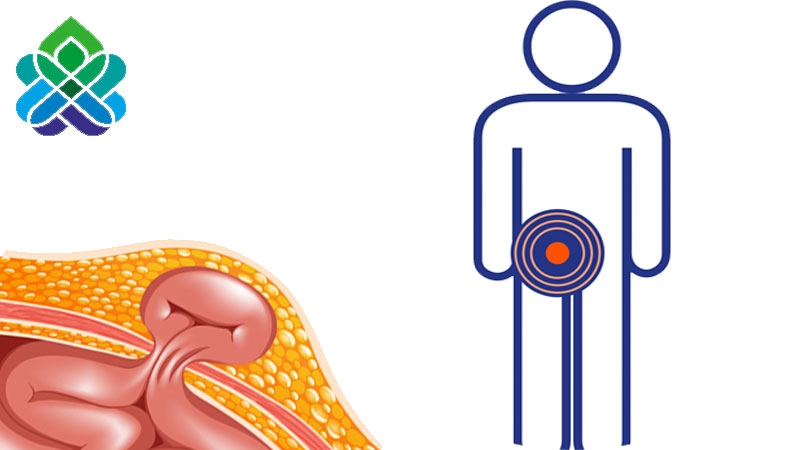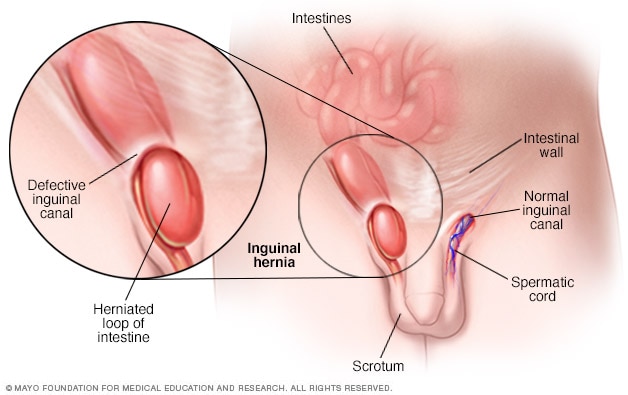
Inguinal Hernia
Overview
An inguinal hernia occurs when tissue, such as part of the intestine, protrudes through a weak spot in the abdominal muscles. The resulting bulge can be painful, especially when you cough, bend over or lift a heavy object.
An inguinal hernia isn't necessarily dangerous. It doesn't improve on its own, however, and can lead to life-threatening complications. Your doctor is likely to recommend surgery to fix an inguinal hernia that's painful or enlarging. Inguinal hernia repair is a common surgical procedure.
Symptoms
Inguinal hernia signs and symptoms include:
- A bulge in the area on either side of your pubic bone, which becomes more obvious when you're upright, especially if you cough or strain
- A burning or aching sensation at the bulge
- Pain or discomfort in your groin, especially when bending over, coughing or lifting
- A heavy or dragging sensation in your groin
- Weakness or pressure in your groin
- Occasionally, pain and swelling around the testicles when the protruding intestine descends into the scrotum
Signs and symptoms in children
Inguinal hernias in newborns and children result from a weakness in the abdominal wall that's present at birth. Sometimes the hernia will be visible only when an infant is crying, coughing or straining during a bowel movement. He or she might be irritable and have less appetite than usual.
In an older child, a hernia is likely to be more apparent when the child coughs, strains during a bowel movement or stands for a long period.
Signs of trouble
If you aren't able to push the hernia in, the contents of the hernia may be trapped (incarcerated) in the abdominal wall. An incarcerated hernia can become strangulated, which cuts off the blood flow to the tissue that's trapped. A strangulated hernia can be life-threatening if it isn't treated.
Signs and symptoms of a strangulated hernia include:
- Nausea, vomiting or both
- Fever
- Sudden pain that quickly intensifies
- A hernia bulge that turns red, purple or dark
- Inability to move your bowels or pass gas
When to see a doctor
Seek immediate care if a hernia bulge turns red, purple or dark or if you notice any other signs or symptoms of a strangulated hernia.
See your doctor if you have a painful or noticeable bulge in your groin on either side of your pubic bone. The bulge is likely to be more noticeable when you're standing, and you usually can feel it if you put your hand directly over the affected area.
Causes
Some inguinal hernias have no apparent cause. Others might occur as a result of:
- Increased pressure within the abdomen
- A pre-existing weak spot in the abdominal wall
- Straining during bowel movements or urination
- Strenuous activity
- Pregnancy
- Chronic coughing or sneezing
In many people, the abdominal wall weakness that leads to an inguinal hernia occurs at birth when the abdominal lining (peritoneum) doesn't close properly. Other inguinal hernias develop later in life when muscles weaken or deteriorate due to aging, strenuous physical activity or coughing that accompanies smoking.
Weaknesses can also occur in the abdominal wall later in life, especially after an injury or abdominal surgery.
In men, the weak spot usually occurs in the inguinal canal, where the spermatic cord enters the scrotum. In women, the inguinal canal carries a ligament that helps hold the uterus in place, and hernias sometimes occur where connective tissue from the uterus attaches to tissue surrounding the pubic bone.
Risk factors
Factors that contribute to developing an inguinal hernia include:
- Being male. Men are eight times more likely to develop an inguinal hernia than are women.
- Being older. Muscles weaken as you age.
- Being white.
- Family history. You have a close relative, such as a parent or sibling, who has the condition.
- Chronic cough, such as from smoking.
- Chronic constipation. Constipation causes straining during bowel movements.
- Pregnancy. Being pregnant can weaken the abdominal muscles and cause increased pressure inside your abdomen.
- Premature birth and low birth weight.
- Previous inguinal hernia or hernia repair. Even if your previous hernia occurred in childhood, you're at higher risk of developing another inguinal hernia.
Complications
Complications of an inguinal hernia include:
- Pressure on surrounding tissues. Most inguinal hernias enlarge over time if not repaired surgically. In men, large hernias can extend into the scrotum, causing pain and swelling.
- Incarcerated hernia. If the contents of the hernia become trapped in the weak point in the abdominal wall, it can obstruct the bowel, leading to severe pain, nausea, vomiting, and the inability to have a bowel movement or pass gas.
- Strangulation. An incarcerated hernia can cut off blood flow to part of your intestine. Strangulation can lead to the death of the affected bowel tissue. A strangulated hernia is life-threatening and requires immediate surgery.
Prevention
You can't prevent the congenital defect that makes you susceptible to an inguinal hernia. You can, however, reduce strain on your abdominal muscles and tissues. For example:
- Maintain a healthy weight. Talk to your doctor about the best exercise and diet plan for you.
- Emphasize high-fiber foods. Fruits, vegetables and whole grains contain fiber that can help prevent constipation and straining.
- Lift heavy objects carefully or avoid heavy lifting. If you must lift something heavy, always bend from your knees — not your waist.
- Stop smoking. Besides its role in many serious diseases, smoking often causes a chronic cough that can lead to or aggravate an inguinal hernia.
qom international patient department
qom ipd ward



















